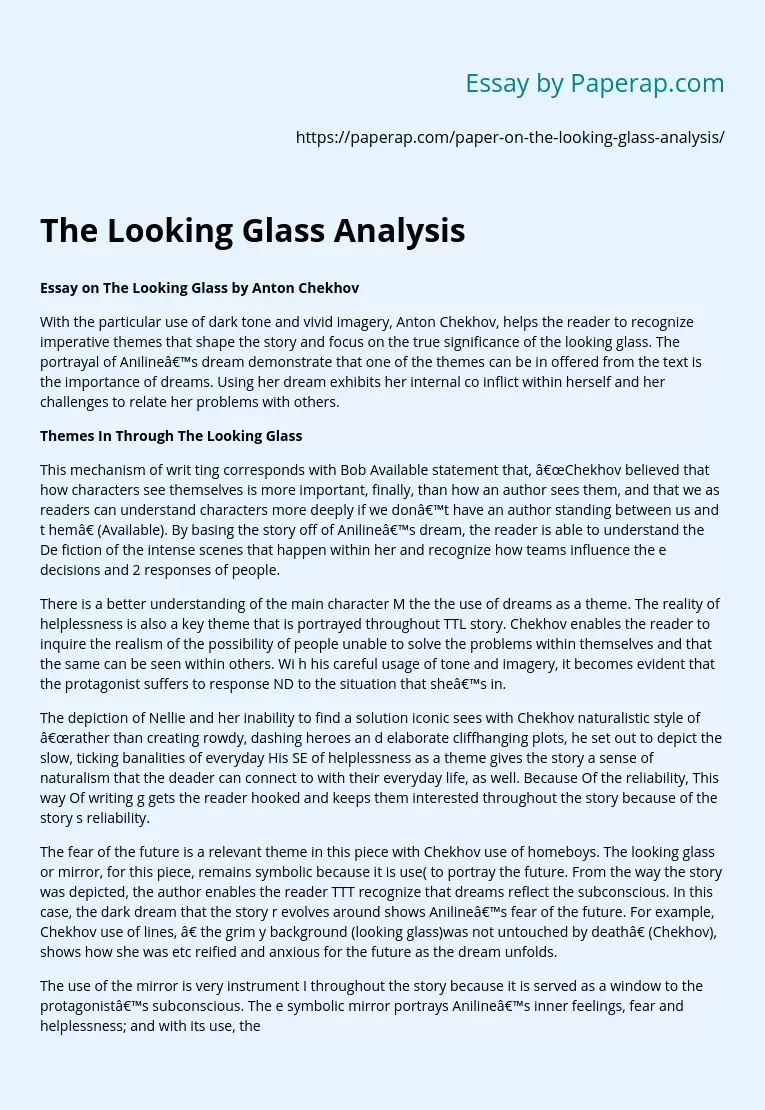The Looking Glass Analysis
Essay on The Looking Glass by Anton Chekhov
With the particular use of dark tone and vivid imagery, Anton Chekhov, helps the reader to recognize imperative themes that shape the story and focus on the true significance of the looking glass. The portrayal of Aniline’s dream demonstrate that one of the themes can be in offered from the text is the importance of dreams. Using her dream exhibits her internal co inflict within herself and her challenges to relate her problems with others.
Themes In Through The Looking Glass
This mechanism of writ ting corresponds with Bob Available statement that, “Chekhov believed that how characters see themselves is more important, finally, than how an author sees them, and that we as readers can understand characters more deeply if we don’t have an author standing between us and t hem” (Available). By basing the story off of Aniline’s dream, the reader is able to understand the De fiction of the intense scenes that happen within her and recognize how teams influence the e decisions and 2 responses of people.
There is a better understanding of the main character M the the use of dreams as a theme. The reality of helplessness is also a key theme that is portrayed throughout TTL story. Chekhov enables the reader to inquire the realism of the possibility of people unable to solve the problems within themselves and that the same can be seen within others. Wi h his careful usage of tone and imagery, it becomes evident that the protagonist suffers to response ND to the situation that she’s in.
The depiction of Nellie and her inability to find a solution iconic sees with Chekhov naturalistic style of “rather than creating rowdy, dashing heroes an d elaborate cliffhanging plots, he set out to depict the slow, ticking banalities of everyday His SE of helplessness as a theme gives the story a sense of naturalism that the deader can connect to with their everyday life, as well. Because Of the reliability, This way Of writing g gets the reader hooked and keeps them interested throughout the story because of the story s reliability.
The fear of the future is a relevant theme in this piece with Chekhov use of homeboys. The looking glass or mirror, for this piece, remains symbolic because it is use( to portray the future. From the way the story was depicted, the author enables the reader TTT recognize that dreams reflect the subconscious. In this case, the dark dream that the story r evolves around shows Aniline’s fear of the future. For example, Chekhov use of lines, ” the grim y background (looking glass)was not untouched by death” (Chekhov), shows how she was etc reified and anxious for the future as the dream unfolds.
The use of the mirror is very instrument I throughout the story because it is served as a window to the protagonist’s subconscious. The e symbolic mirror portrays Aniline’s inner feelings, fear and helplessness; and with its use, the rye becomes successful in bringing together its goals and objectives of the story to the real Overall, is a very successfully written short story by Chekhov that illustrates his mechanisms on his wanting of the reader to understand the co incept of his story, deeply.
He portrays a dream which remains to show its significance to enders tanning the subconscious and by dwelling into the consciousness, readers are able to see situations that puts her in a state of helplessness. By the careful use of dark tone and vivid imagery y, Chekhov is able to connect points that indicate human condition and how problematic situate ions illustrates one’s fear of the unknown.
The Looking Glass Analysis. (2019, Nov 27). Retrieved from https://paperap.com/paper-on-the-looking-glass-analysis/

